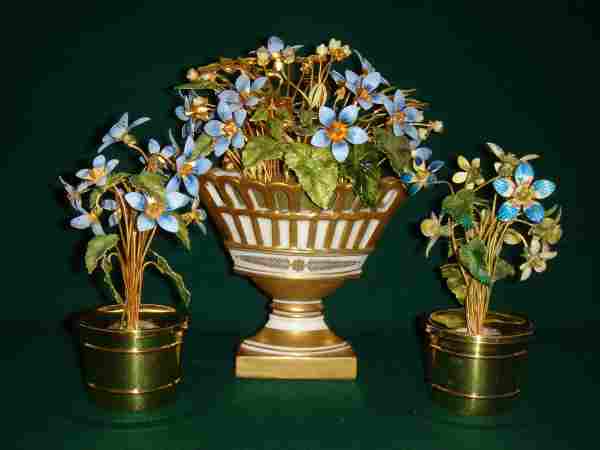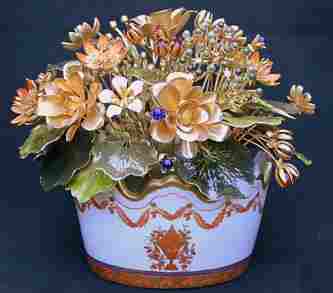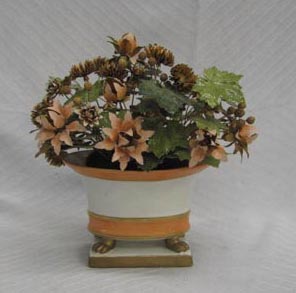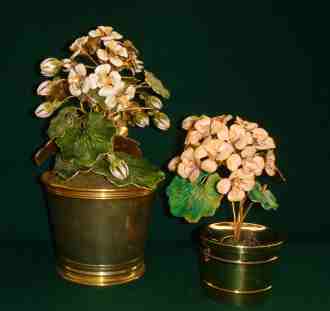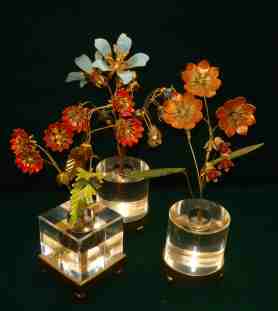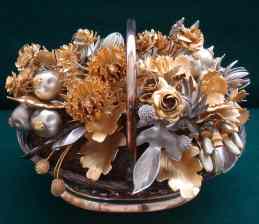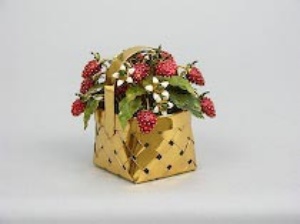by Dorothea
Burstyn
(click on photos to enlarge image)
"BLOOMING BEAUTIFULLY FROM HERE TO ETERNITY….."
Gorham’s Fleurs des Siècles gift line designed by Jane
Hutcheson
"Blooming beautifully from here to eternity to grow more
precious with time…" and "The Gorham Fleurs you will pick will
last forever" were the enthusiastic advertising slogans Gorham
chose to describe their Fleurs des Siècles gift line. The large
selection of flower arrangements, which were produced by Gorham
from the early 1970 to mid-1980s contain an amazing variety of
flowers, leaves, nuts and berries. Each jeweled metal flower or
leaf is handcrafted and hand enameled over gold plate. Looking
at these exquisitely arranged bouquets tucked into sterling and
gold plated cachepots, authentic reproductions of antique
porcelain vases, various baskets or blooming within Murano glass
domes, one has no idea of the romantic story behind their
creation.
Jane Hutcheson, impressed and inspired by the 17th and 18th
century Vincennes porcelain flowers, made up arrangements of
clay flowers that she displayed in the window of Alice Maynard’s
needlework shop at 558 Madison Avenue in New York City. By a
lucky coincidence Vincent Lippe, founder and president of a
national wholesale gift wares concern, saw them there and
recognized immediately their potential
(note 1). He got into
contact with Ms. Hutcheson and secured an exclusive distribution
contract from her. On approaching Gorham, the idea of making
these flower arrangements in metal was enthusiastically adopted
and the march of the "Fleurs des Siècles" to one of Gorham’s
commercially most successful gift lines had begun
(note 2).
The Gorham Giftware Division is described as a world unto
itself. It was headed by Joe Lavoie, who was a business wizard
and had a real knack for spotting and creating new trends
(note 3). In the
seventies the Gorham Company had three main divisions: silver,
china and crystal, and gifts. The main difference among them was
that the silver and china/crystal divisions developed and
introduced several items each year that would become staples in
the line, while the gift division had to cater to ever changing
trends in the market. This meant that even well-selling lines
had to be retired to make room for products with a new look and
theme (note 4).
It took nearly two years from acceptance of
the designs until Gorham could go into production.
Jane Hutcheson spent much time in the Gorham factory
in Providence, where the prototypes were developed.
She reviewed production procedures with Gorham
workers and remembers training women workers for
over 10 years
(note 5). The first design ever produced was
H2 -- a creation in green and white sensitively
arranged in a French style porcelain vase (right).
This first composition shows the main features of almost all
of Jane Hutchenson's flower creations.
Proportionally following the golden ratio
(note 6),
it combines a few large flowers with a multitude of
smaller blooms; the spare spaces are filled out with
fruit and leaf elements. The wire stems are very
flexible, which allows for individual rearranging
and also gives a trembling effect. There is a
dizzying array of different flower and leaf shapes;
Ms. Hutcheson added new forms as the line evolved.
The berries are "jeweled" - opaque glass beads in
deep shades of jade, blue, red, brown and black.
There is also a multitude of gold berry and seed
shapes (below left and right). Inspiration
came from many different sources, when Jane visited
a Japanese flower show, she decided to add an Asian
touch to her line
(note 7).
|
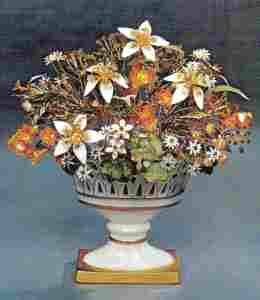 |
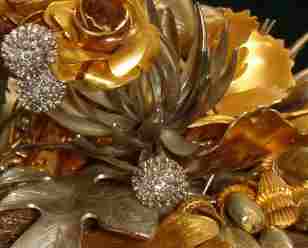 |
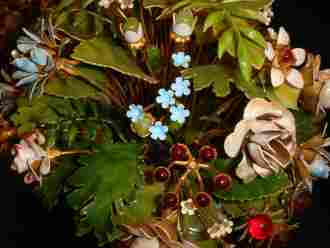 |
Details showing berries and leaf elements
|
|
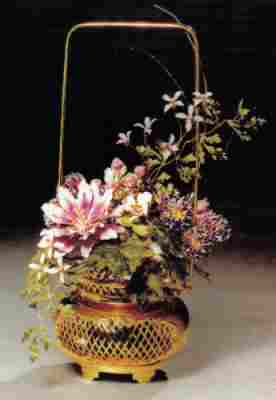 |
(left) Advertised as " Chinese
Basket/Mandarin" 9 inches, sold for $ 200.00,
pictured in the New Yorker, ad October 1973.
A very similar arrangement, but 11 ¼ inches in
height, was called Chrysanthemum Chinese Basket and
sold for $ 400.00. (Price list Gorham 1983)
Monteith shaped bowl, according to Jane Hutcheson
one of the favorites ordered over and over
(below left)
Advertised as "Heirbloom" in the November 1977 ad of
The Magazine Antiques The arrangement was
called "Apricot Oval" and sold for $ 250.00.
(below right)
|
The containers used for the flower arrangements contribute
additional charm. They range from monteith-shaped bowls to
footed neoclassical vases, most of which are authentic
reproductions of French and American porcelain vases from 1770
to 1810. Gorham made these arrangements in a wide range of sizes
and prices. To illustrate this, the image below shows the very
delicate "Edelweiss" in a Krautheim/Bavarian flower vase, the
medium-sized "blue/green jeweled urn arrangement H 16" in a
Herend/Hungary footed vase and the substantial centerpiece
"French Rose Cache pot" (note
8).
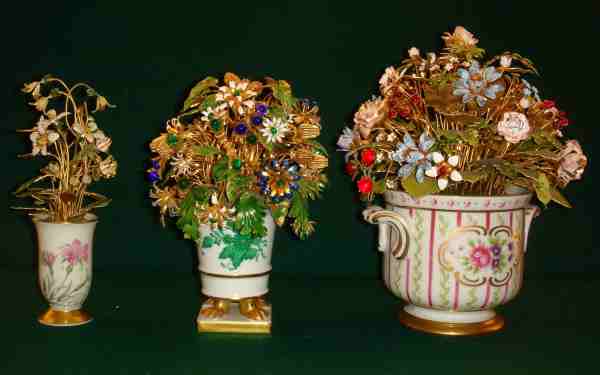 |
from left to right: the very delicate
"Edelweiss" in a Krautheim/Bavarian flower vase,
the medium-sized "blue/green jeweled urn arrangement
H 16" in a Herend/Hungary footed vase
and the substantial centerpiece "French Rose Cache
pot"
|
The bibelots -- dainty arrangements of a few blooms or
topiaries -- were made in two sizes (8 inches and 6 ½ inches in
height) and use silver-plated or gold-plate-on-sterling
cachepots (below left). Plexiglas containers were used
for Fabergé-inspired single blooms (below right).
The most charming by far are the basket
arrangements. They were made in many different
sizes, from 3 ½ inches to 6 inches in width, and
were filled with strawberries, leaves and blooms
(right),
field flowers, lilies of the valley, anemones,
pansies and - my special favorite - with gold and
silver flowers, fruits, nuts and berries (below
left).
Gorham made these also for Cartier. Those with the
Cartier label had finer quality vermeil baskets, but
were filled with the same fruit and flower designs
as mentioned above (below right).
|
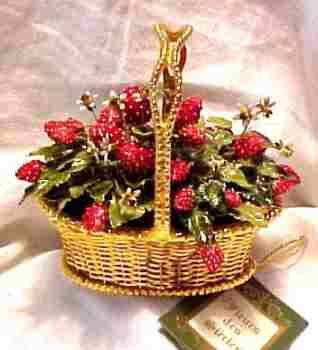 |
These attractive basket designs caught the
eye of another designer, Gloria Vanderbilt, who
started a very similar line of metal flowers for
Franklin Mint. As one can see from one example
(right), the Vanderbilt flower arrangement
copies the Hutcheson concept, but lacks its
sophistication. Jane Hutcheson had her lawyer
contact Ms. Vanderbilt, and then she followed up
with a personal phone call. As a consequence Gloria
Vanderbilt discontinued her flower arrangement line,
and a costly law-suit was avoided
(note 9).
|
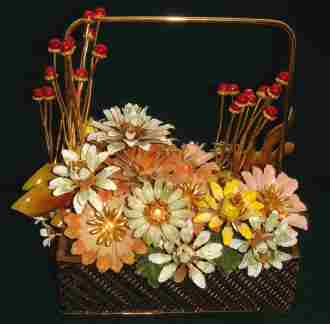 |
Gorham did an excellent promotion for the
Fleurs des Siècles line. The company printed
beautifully illustrated brochures and took out
2-full-page ads in the New Yorker and The Magazine
Antiques over many years. As an additional sales
tool, they issued a Fleurs des Siècles book with
large detailed color illustrations for retailers.
According to the various ads, the Fleurs des Siècles
line was carried by retailers in 52 states and
included many high-prestige giftware and jewelry
stores like Marshall Field in Chicago, Shreve, Crump
and Low in Boston and Shreve in San Francisco, to
name just a few. Each arrangement was delivered with
the green and gold Fleurs des Siècles tag. Limited
editions had an additional letter and registration
card which could be sent back to The Gorham Company
in Providence, R.I. for inclusion in an ownership
registry. The question of which types of Fleurs des
Siècles were chosen for limited editions and which
for open production cannot be conclusively answered
(note 10),
for instance, a limited edition example in my
collection is called "Vincennes", but it is
identical to the arrangement called "French Rose
Cache pot" in The Magazines Antiques ad, November
1980.
|
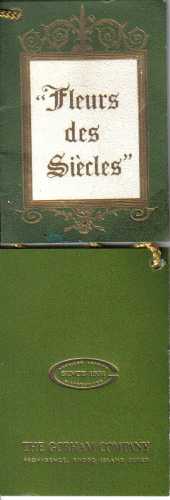 |
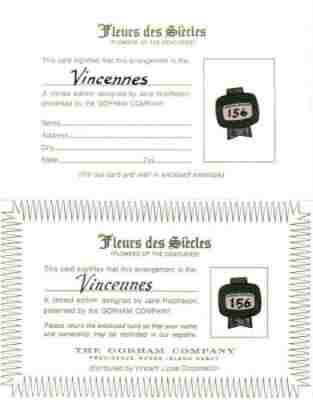 |
Jane Hutcheson designed a few more lines for Gorham.
Advertised with the Fleurs des Siècles were the Fleurs boxes
from 1973 to 1980. These came in various sizes, either silver-
or gold-plated, and in round, rectangular, square and heart
shapes. They were velvet-lined and featured small Fleurs des
Siècles arrangements on their lids. In 1979 Jane Hutcheson
copyrighted a new line of "Imperial eggs", which were a great
success, as they sparked the interest of a broad range of
collectors. Their Murano glass domes presented a certain
problem, since they had to be produced well and properly sealed
(note 11). Ms.
Hutcheson also designed flower arrangements in glass. Gorham had
these produced in Japan and marketed them under the "Jardins de
Verre" name.
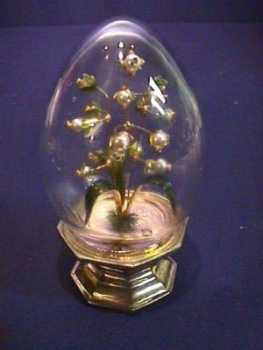 |
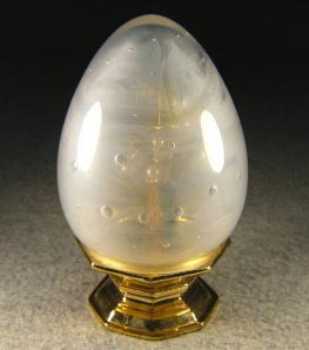 |
Lily of the valley Imperial egg
|
picture illustrating production problems
with Imperial eggs line
|
Proud owners of Fleurs des Siècles
arrangements will be pleased to hear that one
special arrangement is in the English Royal
Collection.
An order by the Duke and Duchess of Bedford as a
birthday present for Queen Elizabeth II, it was
personally arranged by Jane Hutcheson and delivered
by a Gorham agent to England.
It is a very rich composition of white camellias, a
profusion of smaller blooms and further enriched
with berries and various leaves. This one of a kind
creation stands 18 ½ inches high and 16 ¼ inches in
diameter (right).
|
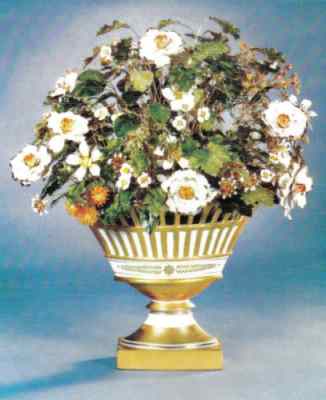 |
The Fleurs des Siècles -- exquisite floral arrangements of
artistic refinement -- are sought-after collector’s items now
and due to their workmanship, durability and timeless beauty can
be considered the classic antiques of the future.
I would like to thank Ms. Kay O. Freeman for making the
connection with Ms. Jane Hutcheson, many thanks also to Dr. W.
P. Hood Jr. for reading this manuscript.
Dorothea Burstyn
Editor of the SSC Journal (Silver Society of Canada)
- 2008 -
|
|
|
 ASSOCIATION OF SMALL COLLECTORS OF ANTIQUE SILVER
ASSOCIATION OF SMALL COLLECTORS OF ANTIQUE SILVER



